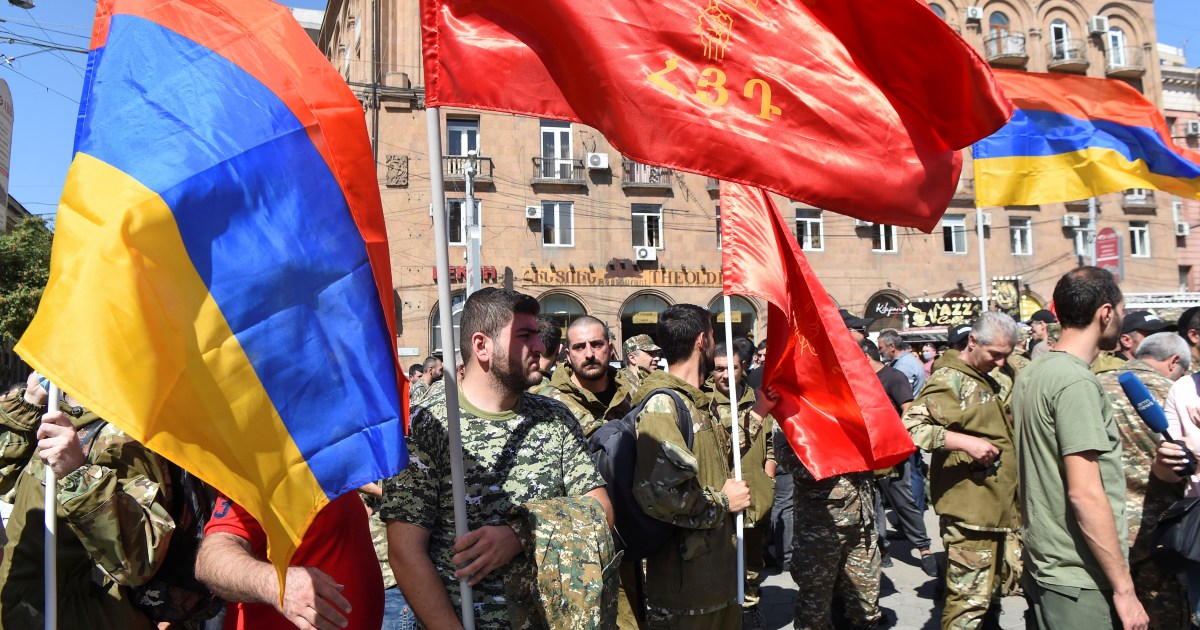
REPORTER'S NOTEBOOK
While international media focuses on the fighting, it is a conflict largely seen and read through official tweets, Facebook posts and emails.
Tbilisi, Georgia – Nagorno-Karabakh is today uniquely isolated in more ways than one.
From Azerbaijan, it should easily be reachable from the capital, Baku. But there is no way through the armies stationed on the front lines, separated in some places by not more than a few hundred metres of no man’s land, encamped in a vast network of impenetrable trenches and surrounded by minefields.
When I last travelled there to cover an outbreak in hostilities in April 2016, an asphalt road from Armenia deteriorated the closer we approached the territory. It was a tense, bone-jarring ride.
Some of the roads have since been resurfaced thanks to a more youthful and less corruption-prone government in Yerevan, but that first sight of the “Black Garden” is no less alluring – a forested mountain range sloping down to meadows and plains baked yellow in the fierce heat of summer.
The region is geographically isolated, but so too are its people – isolated from the narrative.
There are fewer than 150,000 people living in Karabakh (today almost exclusively ethnic Armenian).
There are tens of thousands of Azerbaijanis exposed in farmsteads and villages along Azerbaijan’s side of the so-called line of control. And in Armenia, there are thousands of villagers close to the border with Azerbaijan.
We are talking about the people not wearing military uniforms – all vulnerable to the heavy weaponry now being deployed.
They are the civilians referred to in a daily headcount of casualties, or those who have escaped with their lives but have seen their homes peppered by shrapnel, roofs blasted off, or walls reduced to masonry rubble.
They are those who have endured the threat of all-out war for decades, living through sporadic cross-border violence, mortars, missiles and sniper fire, making it often impossible to go out and farm their fields in safety.
And they are the hundreds of thousands of Azerbaijanis and Armenians suffering from the trauma of exile. As many as a million people are refugees or internally displaced people from the inter-ethnic conflict over Karabakh in the 1990s and the ghastly pogroms in the Azerbaijani SSR as the Soviet Union was collapsing.
Reaching Karabakh and the people who live in and around it was never easy. The pandemic has deterred newsrooms from dispatching journalists to travel.
Now their human stories risk being drowned out by officialese. A sterile terminology thrives, the language of security bloc acronyms and geopolitics, spouted by presidents and ministers, spokespeople, and us, the reporters too.
The international media focuses its attention once again on the fighting, but it is a conflict for now largely seen and read through official tweets, Facebook posts and emails.
We watch through cameras mounted on military drones and hilltop high magnification lenses. The videos depict tanks, anti-aircraft defences and personnel carriers disappearing in puffs of smoke.
Young recruits barely out of school are human beings too, but pixelated or hidden inside this war machinery.
Monopolised messaging
Some claims are a distraction. Azerbaijan says foreign fighters are assisting Armenian forces. Armenian officials claim Syrian mercenaries are already imposing Islamic law in Azerbaijani villages.
At the time of writing, fewer than 48 hours since the latest fighting began, none of it – yet – is independently verifiable.
Official sources have monopolised the messaging. And internet restrictions in Azerbaijan have stifled conversations between its citizens on social media.
Much of the official messaging seems vainglorious – Azerbaijan’s defence minister describes the liberation of occupied lands as a “sacred duty”.
An Armenian tweet shows a pious priest brandishing a Kalashnikov.
Controlling the narrative and the media obscures the human suffering. The pandemic, the geography and the information war make it all the more difficult to penetrate the isolation of Nagorno-Karabakh.
World - Latest - Google News
September 29, 2020 at 03:34AM
https://ift.tt/2EFJzar
Nagorno-Karabakh: Information war and competing media narratives - Al Jazeera English
World - Latest - Google News
https://ift.tt/2SeTG7d
Bagikan Berita Ini














0 Response to "Nagorno-Karabakh: Information war and competing media narratives - Al Jazeera English"
Post a Comment